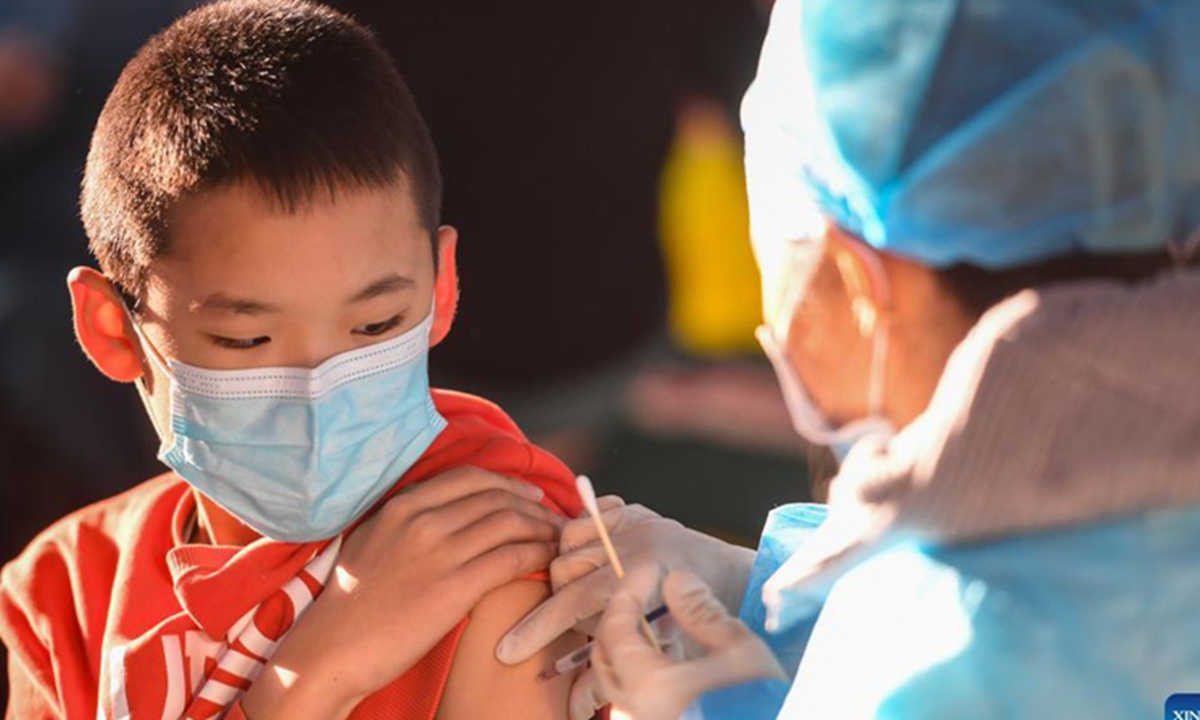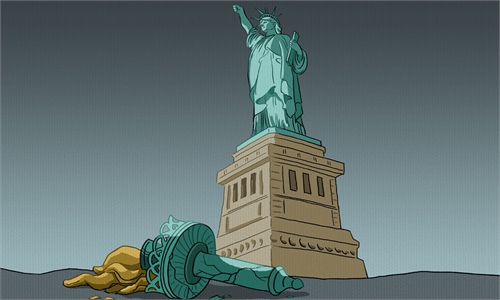
A kid receives a dose of COVID-19 vaccine at a school in Hohhot, north China's Inner Mongolia Autonomous Region, Nov. 23, 2021. Hohhot recently launched a COVID-19 vaccination campaign for children aged 3 to 11. Photo: Xinhua
Politico published an article on Tuesday entitled "China's 'zero Covid strategy' chokes US-China ties," claiming China's strict rules for epidemic prevention and control, including entrance restrictions, are hurting relations with the US.But who is to blame? Take a look at the death toll and daily confirmed COVID-19 cases in the US, one will readily know the answer.
Politico quoted Stephen A. Orlins, president of the National Committee on US-China Relations, as saying that a cost of zero-COVID policy "is the lack of people-to-people exchanges - with Chinese coming here and Americans going there - is actually worsening the relationship." The article noted that China's economy is on the rise, yet "external relations are at an all-time low." Even if China is upgrading "fast track" travel arrangements, Politico still portrayed the move as "too little, too late."
The US is so good at passing the buck to others. It is the US' total failure in countering the COVID-19 that has blocked people-to-people exchanges with China. And it is the US that has been clamoring day in and day out that China has imposed increasing "threats" to the US. Now it thinks more exchanges are needed?
It's like there are two United States of America. One spares no effort in containing, isolating and decoupling with China, while the other blames China for keeping a distance from the US and demands China to open up.
The reason behind the recent eccentric rhetoric from the US is obvious - it needs China. The US can neither take its epidemic under control nor save its economy on its own. US businesses are shutting down, unemployment figures are on the rise, monetary policies have lost their traction, and inflation is surging ceaselessly. The US has finally sensed the need to cooperate with China, at least in economic sectors.
The US won't let go of its prestige as a hegemon and a power to boss others around. So it has adopted a twisted approach - seeking collaboration from China but continuing to point fingers at it. Yet as long as the US cannot rein in the coronavirus on its own soil, its purposes will not be met.
Even if China relaxes its entrance restrictions and opens its doors, few people would go to the US, a country mired in the public health crisis, Xu Liang, an associate professor at the School of International Relations at Beijing International Studies University, told the Global Times.
Chinese people are not the only ones who would hesitate to go to the US for "people-to-people exchanges." People around the world likely feel the same.
On Sunday, The New York Times published an article, "When the Biggest Spenders Aren't Coming Back Any Time Soon," saying, "This was supposed to be the year travel came back," but "biggest spenders - Chinese tourists - aren't returning anytime soon." The report also targets China's effort to maintain a zero-COVID approach.
When the US needs money from China, it is not afraid that China might "threaten" its democracy. When the US needs a recovery for its tourism industry, Chinese people are not "forced labor" without freedom, but the biggest spenders abroad. Unfortunately, while Americans may find it fine to live with the deadly virus, Chinese people cherish their lives.
If the US can fight COVID-19 as earnestly as China has done, not necessarily with the same policies, but with the same attitude, the epidemic in the US might have passed by now. Its tourism industry and economy would have already stepped on a recovery track. But Washington has been treating the virus as a political tool since the very beginning, something as an excuse to launch a war of words against China for short-sighted political interests. The US did nothing helpful in the battle, except making the rest of the world bear the consequences of its failure.
What chokes China-US ties is not China's zero-COVID approach, but US hegemonic behavior, Xu noted. Worse, the declining hegemon is failing in confronting the real challenges and make due adjustments. The one that should take a pill is the US, not China.
If the US expects the people-to-people exchanges, it is advised to rest assured, as things will get better when the US sweeps away COVID-19. But before that, the US needs to make up its mind - will it still view China as a "threat"?


